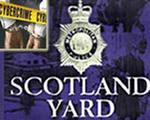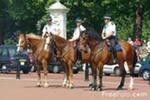Учебник для бакалавров. Учебник для бакалавриата по направлению Юриспруденция
 Скачать 1.2 Mb. Скачать 1.2 Mb.
|
UNIT 7. THE BRITISH POLICE – SOME HISTORICAL FACTSTEXT 1Some Historical Facts Vocabularyto keep public order – поддерживать общественный порядок to prevent a crime – предотвратить преступление a sense of insecurity – чувство незащищенности notorious – пользующийся дурной славой to pay rewards – давать денежное вознаграждение to pass an act – принять законодательный акт 1. Прочитайте и переведите текст об истории возникновения полиции в Великобритании. Ответьте на вопросы.Why did Justices of the Peace have to employ thief-takers? What did Jonathan Wild specialize in? What did the Second Transportation Act lay down? Why did the British police system become the model for police forces in other countries? The police play the most important part in keeping public order and protecting persons and property. To do their work properly the police need necessary powers. They have the power to intervene to prevent a crime. If their orders are not obeyed, they may arrest the people who have broken the law and bring them before the courts. Centuries before the formation of any official police force passed when attempts were made to provide some means of ‘community policing’. In England keeping law and order was the special responsibility of Justices of the Peace (JPs). Despite the cruel penalties inflicted upon criminals the state of lawlessness in the seventeenth and eighteenth centuries was appalling. By the second half of the eighteenth century the general population lived with a terrifying sense of insecurity. Gangs of criminals roamed the towns. Any form of transport was risky. Justices of the Peace had to employ thief-takers to catch criminals. Thief-takers were often no better than the criminals themselves. Sometimes they were criminals who knew the criminal underworld well. The most notorious thief-taker of all was Jonathan Wild who operated in the early part of the eighteenth century. He began his career in a small way informing on criminals who were suspected of crime. Eventually he built up a criminal empire of his own. His speciality was the organization of robberies and burglaries. He was then paid rewards by the victims for securing the return of their property. In 1719 as a direct result of activities of this kind Parliament passed the Second Transportation Act which laid down that anyone taking a reward for receiving stolen goods, who did not also help to arrest the thief and give evidence against him, was guilty of a 'felony' (serious crime which could result in sentence of death). Eventually, Wild was himself caught and prosecuted. The first police force to become an organized body of men wearing uniforms and given special powers was named the Metropolitan Police Force ('The Met'), because it policed the metropolis of London. This force was created by the Metropolitan Police Act 1829. At that time Sir Robert Peel was the Home Secretary, and policemen were therefore known as 'Peelers' or 'Bobbies'. The new police force first went out on duty on 29 September 1829.The force made a poor start. By the end of the year the most of men had been dismissed because of being drunk on duty. It is hardly surprising that in the early days of the force public opinion was very much against it. Newspapers complained bitterly that the police behaved with brutality in their enthusiasm to make arrests. At the same time the police were blamed for failing to clear up crime. Nevertheless, the value of an organized police force soon became apparent. The first plain- clothes detectives were used to gather information on the activities of gangs of criminals. The Metropolitan Police force was well organized and disciplined and after the initial period of public skepticism became the model for other police forces in Great Britain and this police system had been adopted throughout the world. Соотнесите английские словосочетания с их русскими эквивалентами. Обратите внимание на их перевод.
Выразите согласие/несогласие со следующими утверждениями. There is no difference between thieves and thief-takers. Jonathan Wild investigated burglaries and robberies. People had to pay Jonathan Wild for securing the return of their stolen property. Parliament passed the Second Transportation Act to reduce crime. The Metropolitan police was organized by Sir Robert Peel. TEXT 2The British Police Vocabularyto prosecute–преследовать в судебном порядке to have judicial functions– иметь (выполнять) судебные функции to deter– удерживать от чего-либо deterrent – сдерживающий фактор abuse of power– злоупотребление служебным положением the Metropolitan Police –Столичная полиция to supervise the investigation – осущеcтвлять надзор за расследованием forensic science– судебная экспертиза 4. Прочитайте и переведите текст. Ответьте на вопросы.What are the functions of the British police? What is the Сode of Practice designed for? How are the British police organized? Are women allowed to serve in the police forces? Why is it important for the police to work in close contact with the public?  The police have many functions in the legal process. As well as gathering information for offences to be prosecuted in the courts the police have wide powers to arrest, search and question people suspected of crimes and to control the actions of members of the public during public demonstrations The police have many functions in the legal process. As well as gathering information for offences to be prosecuted in the courts the police have wide powers to arrest, search and question people suspected of crimes and to control the actions of members of the public during public demonstrationsand meetings. In some countries the police have judicial functions; for example, they may take a decision as to guilt in a driving offence and impose a fine without the involvement of a court. The mere presence of the police is a factor in deterring people from committing offences. A just legal system needs an independent, honest police force. In countries where the public trusts the police force people are more likely to report crimes, and it seems that they are also more likely to be law-abiding. Police powers are great and they are given to the police as part of their overall responsibility to enforce the law but they are all governed by the law and are subject to strict control by rules and regulations. For example, a British police officer is subject to the law and may be sued or prosecuted for any wrongful act committed in carrying out duties. Legislation and the code of practice in England are designed to prevent any abuse of power enjoyed by the police officer. In 1985 The Police Complaints Authority was established to supervise the investigation of any serious complaint against the police officer.  The police in Britain are organized very differently from any other country. Most countries have a national police force which is controlled by central Government. Britain has no national police force although the police is supervised by the central Government’s Home Office. The police in Britain are organized very differently from any other country. Most countries have a national police force which is controlled by central Government. Britain has no national police force although the police is supervised by the central Government’s Home Office.There is a separate police force for each of 52 areas into which the country is divided. Each has a police authority – a committee of local county councilors and magistrates. The policing of London is in the hands of the Metropolitan Police Force with headquarters at New Scotland Yard. The forces co-operate with each other but it is unusual for members of one force to operate in another’s area unless they are asked to give assistance. One of the important powers of the police which has caused much difficulty and controversy is the power to question or interview persons suspected of crime. The Police and Criminal Evidence Act 1984provides numerous laws to protect people in England who are being interviewed by the police. All members of the British police must gain a certain level of academic qualifications at school and undergo a period of intensive training. The career structure in the British police force allows to be promoted from constable to sergeant, then through inspector and superintendant to chief constable. In London the Head of the Force is called the Metropolitan Commissioner. He heads the force which now has more than 25,000 police officers – one-fifth of all the officers in England and Wales. The police are helped by a number of special constables – members of the public who work for the police voluntarily for a few hours a week. Women make up about 10 per cent of the police force. In most countries the police carry guns. The British police generally do not carry firearms, except in Northern Ireland. In certain circumstances specially trained police officers can be armed, for instance, those who guard politicians and diplomats or who patrol airports but only with the signed permission of a magistrate. The police now use advanced modern equipment. This ranges from motorbikes and squad cars to helicopters. It includes the most advanced surveillance aids and access to the Police National Computer and the facilities of the Forensic Science Service. This service runs highly sophisticated laboratories where forensic scientists carry out the scientific examination of exhibits. Ever since the first police force in England was founded, the police have come under criticism – for denying civil liberties, for failing to catch criminals or for catching the wrong people. These cases which have resulted in serious injustice have had a profound effect upon the whole criminal justice system and, of course, the police and the manner in which they carry out their duties. They have also resulted in very significant changes in the law. Соотнесите английские словосочетания с их русскими вариантами перевода.
Выразите согласие/несогласие со следующими утверждениями. The British police have no judicial power. The police have judicial functions to impose a fine without the involvement of a court. The policing in London is in the hands of Scotland Yard. British policemen always carry firearms. The Police forces in England do not cooperate with each other. It is not necessary for policemen to be well-educated. Работа в парах. Соотнесите названия полицейских подразделений, данные в рамке, с их описаниями (1-9).Dog handling Crime prevention Traffic wardens Drugs Squad Community relations Mounted police Scenes of crimes and forensic science Murder Squad Flying Squad … All forces have a department of officers trained to give advice on how citizens may best protect themselves and their property against criminals. They often visit schools and make presentations to children. … The job of Community Liaison Officers is to improve relations between the police and the different parts of the community they serve, including young people in the area. This includes race relations work and visiting of schools. … These officers are specially skilled in training and handling police dogs, whose duties may range from protection against violent criminals to assisting in the investigation of crime. (drug, terrorism).  … Even in these modern times the police still make use of horses as a particularly effective means of crowd control. … Even in these modern times the police still make use of horses as a particularly effective means of crowd control.… Scenes of Crimes Officers are expert in visiting the scenes of crimes and searching for clues. They take fingerprints or the castings of shoe- prints, and remove any item of interest which will require laboratory examination. Police officers are also trained to work in the laboratories. … These officers must become expert in the identification of a whole range of prohibited dangerous drugs and substances. … These branches of the force deal with the most serious investigations into murder and other violent crime, such as armed robbery. … These officers wear plain-clothes and specialize in detective work. … Their job is to make sure that drivers obey the parking regulations. It is the police who are responsible for controlling offences like speeding, careless driving and drunken driving. | ||||||||||||||||||||||||||||||||||||||||||||||||||||||||||||||||||||||||||||||||||
